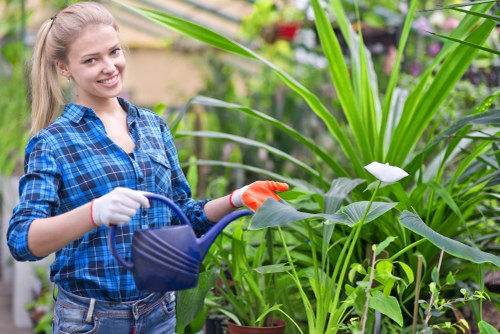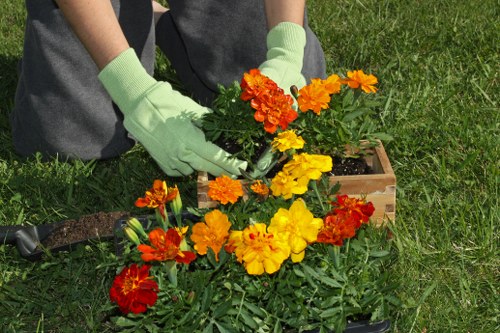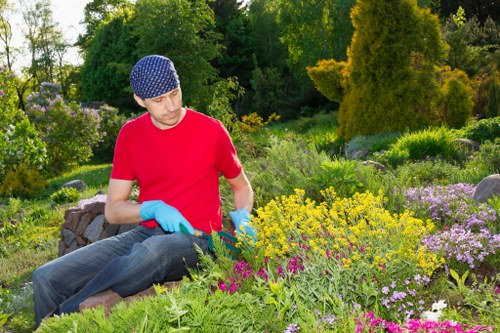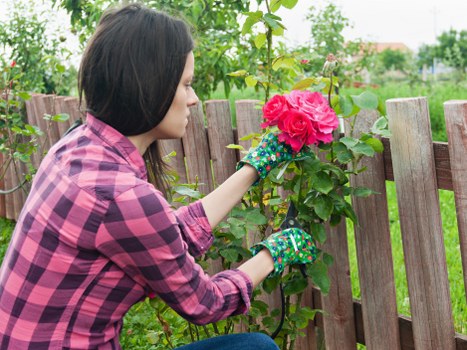Garden Maintenance in Plaistow

Maintaining a beautiful garden in Plaistow requires dedication, knowledge, and the right set of tools. Whether you are a seasoned gardener or a beginner, understanding the unique climate and soil conditions of Plaistow is essential for successful garden upkeep.
With the right garden maintenance practices, you can ensure that your plants thrive throughout the year, providing a serene and aesthetically pleasing outdoor space for your home.
In this comprehensive guide, we will explore various aspects of garden maintenance in Plaistow, including seasonal tasks, essential tools, and tips for promoting plant health.
Understanding Plaistow’s Climate

Plaistow enjoys a temperate maritime climate, characterized by mild summers and cool winters. This climate is conducive to a wide variety of plant life, but it also requires specific maintenance strategies to address seasonal changes.
Understanding the local weather patterns, rainfall distribution, and temperature variations is crucial for effective garden maintenance. This knowledge helps in selecting the right plants and scheduling maintenance activities accordingly.
Additionally, the soil in Plaistow tends to be clayey, which affects drainage and nutrient retention. Proper soil management practices, such as aeration and the use of organic compost, can significantly enhance garden health.
Essential Garden Maintenance Tasks

1. Lawn Care
A well-maintained lawn is the foundation of any garden. Regular mowing, watering, and fertilizing are essential to keep your grass healthy and vibrant.
Key Lawn Care Tips:
- Mow the lawn regularly, keeping the grass height between 2-3 inches.
- Water early in the morning to reduce evaporation and prevent fungal diseases.
- Apply a balanced fertilizer in the spring and autumn to promote growth.
Proper lawn care not only enhances the appearance of your garden but also provides a healthy environment for other plants and beneficial insects.
2. Pruning and Trimming
Pruning is vital for maintaining the shape and health of your plants. It helps in removing dead or diseased branches, promoting air circulation, and encouraging new growth.
Regular trimming of shrubs and hedges ensures a neat appearance and prevents overgrowth that can overshadow other plants.
Pruning Best Practices:
- Use sharp and clean tools to make precise cuts.
- Prune during the growing season to avoid stressing the plants.
- Remove no more than one-third of the plant’s foliage at a time.
3. Planting and Mulching
Planting the right species suited to Plaistow’s climate is essential for a thriving garden. Consider native plants that are well-adapted to local conditions and require less maintenance.
Mulching is another important maintenance task that helps in retaining soil moisture, suppressing weeds, and regulating soil temperature.
Mulching Tips:
- Apply a 2-3 inch layer of organic mulch around plants.
- Avoid piling mulch against plant stems or tree trunks.
- Replenish mulch as needed, especially after heavy rains.
Seasonal Garden Maintenance

Spring Maintenance
Spring is a crucial time for garden maintenance in Plaistow. Begin by cleaning up any debris left from the winter months, such as fallen leaves and dead plants.
Prune dormant trees and shrubs to encourage healthy growth, and prepare garden beds by adding compost or organic matter to enrich the soil.
Spring Tasks:
- Seed or plant new grass areas.
- Fertilize lawns and garden beds.
- Start planting spring-blooming flowers.
Summer Maintenance
During the summer months, focus on maintaining adequate moisture levels in your garden. Regular watering is essential, especially during dry spells.
Monitor plants for signs of pests and diseases, addressing any issues promptly to prevent widespread damage.
Summer Tasks:
- Water plants deeply and consistently.
- Apply mulch to retain soil moisture.
- Prune back overgrown plants to improve air circulation.
Autumn Maintenance
Autumn is the time to prepare your garden for the colder months. Clear out spent plants and add compost to replenish the soil’s nutrients.
Rake fallen leaves to prevent them from smothering your lawn and consider planting autumn-blooming species to maintain garden color.
Autumn Tasks:
- Plant bulbs for spring flowering.
- Protect tender plants from frost.
- Store or winterize garden tools.
Winter Maintenance
Winter in Plaistow requires minimal garden maintenance, but there are still tasks to ensure your garden stays healthy.
Protect evergreen plants from harsh weather by adding extra mulch or using protective covers. Regularly check for ice damage and remove snow gently to prevent breakage.
Winter Tasks:
- Prune dead branches from trees and shrubs.
- Plan and prepare for the upcoming gardening season.
- Inspect and repair garden structures.
Essential Tools for Garden Maintenance

Basic Gardening Tools
Having the right tools is fundamental to efficient garden maintenance. Some essential tools include:
- Pruners: For trimming and shaping plants.
- Spades and Shovels: For digging and soil preparation.
- Rakes: For gathering leaves and leveling soil.
- Garden Hose: For watering plants effectively.
- Wheelbarrow: For transporting soil, compost, and plants.
Investing in high-quality tools ensures durability and ease of use, making garden maintenance tasks more manageable.
Advanced Tools:
- Electric Lawn Mower: For efficient lawn maintenance.
- Hedge Trimmer: For precise trimming of hedges and shrubs.
- Garden Fork: For aerating compacted soil.
Organic Garden Maintenance Practices
Soil Health
Maintaining healthy soil is the cornerstone of a thriving garden. Incorporate organic compost and mulch to enhance soil texture and fertility.
Regularly testing soil pH and nutrient levels helps in adjusting amendments to meet plant requirements.
Organic Soil Practices:
- Use compost to enrich the soil with organic matter.
- Implement crop rotation to prevent nutrient depletion.
- Introduce green manure crops to boost soil health.
Natural Pest Control
Controlling pests organically reduces the risk of harming beneficial insects and the environment. Encourage natural predators like ladybugs and birds to inhabit your garden.
Use companion planting strategies to deter pests; for example, planting marigolds alongside vegetables can repel harmful insects.
Natural Pest Control Methods:
- Introduce beneficial insects to the garden.
- Use neem oil or insecticidal soap for pest management.
- Implement physical barriers like nets and row covers.
Watering Strategies for a Healthy Garden
Efficient Watering Techniques
Water conservation is crucial, especially during dry periods. Implementing efficient watering techniques ensures that plants receive the necessary moisture without wastage.
Drip irrigation systems deliver water directly to the plant roots, reducing evaporation and runoff.
Watering Tips:
- Water early in the morning to maximize absorption.
- Use soaker hoses for deep and consistent watering.
- Collect rainwater for garden use.
Rainwater Harvesting
Rainwater harvesting is an eco-friendly way to provide your garden with a sustainable water source. Installing rain barrels can capture and store rainwater from your roof gutters.
This collected water can be used during dry spells, reducing your dependence on municipal water supplies.
Rainwater Harvesting Benefits:
- Reduces water bills.
- Provides a natural and chemical-free water source.
- Helps in managing stormwater runoff.
Promoting Plant Health
Fertilization
Proper fertilization ensures that plants receive the necessary nutrients for growth and development. Choose fertilizers based on specific plant needs and soil conditions.
Organic fertilizers, such as compost and bone meal, provide a slow-release source of nutrients, promoting long-term soil health.
Fertilization Tips:
- Conduct soil tests to determine nutrient deficiencies.
- Apply fertilizers during the active growing season.
- Avoid over-fertilizing, which can harm plants and the environment.
Disease Prevention
Preventing plant diseases is a key aspect of garden maintenance. Rotate crops to minimize the buildup of pathogens and maintain healthy plant growth.
Regularly inspect plants for signs of disease, such as discoloration, wilting, or unusual spots, and take immediate action if needed.
Disease Prevention Strategies:
- Maintain proper spacing to enhance air circulation.
- Remove and dispose of infected plant material.
- Use disease-resistant plant varieties.
Garden Design and Layout
Planning Your Garden Layout
A well-planned garden layout enhances functionality and aesthetics. Consider factors like sunlight exposure, soil type, and plant compatibility when designing your garden.
Incorporate pathways and seating areas to create a welcoming environment. Use raised beds or container gardening for better soil control and accessibility.
Garden Design Tips:
- Group plants with similar watering and sunlight needs together.
- Use vertical elements like trellises to maximize space.
- Incorporate a mix of perennials and annuals for year-round interest.
Choosing the Right Plants
Selecting the appropriate plants is essential for a thriving garden in Plaistow. Opt for native species that are adapted to the local climate and soil conditions.
Consider the mature size of plants to avoid overcrowding and ensure that each plant has adequate space to grow.
Plant Selection Tips:
- Choose drought-tolerant plants for water conservation.
- Incorporate flowering plants to attract pollinators.
- Select plants with varying textures and colors for visual appeal.
Mulching Techniques
Benefits of Mulching
Mulching is a fundamental garden maintenance practice that offers numerous benefits, including moisture retention, weed suppression, and soil temperature regulation.
Organic mulches, such as bark, straw, and compost, break down over time, enriching the soil with essential nutrients.
Mulching Benefits:
- Reduces water evaporation from the soil surface.
- Prevents weed growth by blocking sunlight.
- Improves soil structure and fertility.
How to Mulch Effectively
Applying mulch correctly is crucial to maximizing its benefits. Spread a uniform layer of mulch around your plants, ensuring it does not touch the stems or trunks to prevent rot.
Avoid piling mulch too thickly, as it can hinder water penetration and root growth.
Effective Mulching Practices:
- Apply mulch in the spring and replenish as needed.
- Use different types of mulch for various garden areas.
- Combine mulch with other soil amendments for optimal results.
Pruning and Trimming Techniques
Pruning for Health and Aesthetics
Pruning is essential for maintaining the health and appearance of your garden plants. It involves removing dead, damaged, or overgrown branches to promote vigorous growth.
Proper pruning techniques help prevent diseases and improve air circulation around the plants, reducing the risk of fungal infections.
Pruning Techniques:
- Use sharp and sanitized tools to make clean cuts.
- Prune at the correct time of year for each plant species.
- Cut just above a bud or lateral branch to encourage new growth.
Trimming Hedges and Shrubs
Regular trimming of hedges and shrubs is necessary to maintain their shape and encourage dense foliage. Overgrown hedges can become unruly and detract from the garden’s overall appearance.
Use hedge trimmers for even cuts and to achieve the desired shape, whether it’s formal or natural.
Trimming Tips:
- Trim hedges at least twice a year during the growing season.
- Remove any crossing or inward-growing branches.
- Step back frequently to assess the shape and make adjustments as needed.
Pest and Disease Management
Identifying Common Pests
Gardens in Plaistow can attract a variety of pests, including aphids, slugs, and caterpillars. Identifying these pests early is key to effective management.
Regularly inspect your plants for signs of infestation, such as chewed leaves, discoloration, or the presence of the pests themselves.
Common Garden Pests:
- Aphids: Small insects that suck plant sap, causing leaves to curl and stunt growth.
- Slugs: Mollusks that feed on tender plant parts, leaving behind slimy trails.
- Caterpillars: Larvae of moths and butterflies that consume foliage voraciously.
Effective Disease Prevention
Preventing plant diseases involves maintaining good garden hygiene and practicing proper planting techniques. Remove and dispose of any diseased plant material promptly.
Ensure adequate spacing between plants to promote air circulation, reducing the likelihood of fungal infections.
Disease Prevention Tips:
- Water plants at the base to keep foliage dry.
- Use disease-resistant plant varieties.
- Apply fungicides as a preventive measure when necessary.
Soil Management
Improving Soil Fertility
Healthy soil is the foundation of a thriving garden. Regularly amend your soil with organic matter to enhance its structure, fertility, and drainage.
Compost, well-rotted manure, and leaf mold are excellent sources of organic matter that improve soil quality.
Soil Fertility Tips:
- Incorporate compost into garden beds before planting.
- Use cover crops during the off-season to add nutrients to the soil.
- Rotate crops to prevent nutrient depletion and reduce disease incidence.
Soil pH and Testing
Maintaining the appropriate soil pH is essential for nutrient uptake and overall plant health. Most garden plants prefer a slightly acidic to neutral pH range.
Regular soil testing helps determine pH levels and identify any imbalances, allowing you to make necessary adjustments.
Soil Testing Tips:
- Conduct soil tests annually to monitor pH and nutrient levels.
- Use lime to raise pH or sulfur to lower it, based on test results.
- Follow recommended application rates to avoid overcorrection.
Composting and Waste Management
The Benefits of Composting
Composting recycles garden and kitchen waste into valuable organic matter that enhances soil fertility. It reduces landfill waste and promotes a sustainable gardening practice.
By composting, you create nutrient-rich soil amendments that improve plant growth and soil health.
Composting Tips:
- Combine green materials (vegetable scraps) with brown materials (dry leaves) for balanced composting.
- Turn the compost regularly to aerate and speed up decomposition.
- Maintain moisture levels to facilitate microbial activity.
Managing Garden Waste
Effective garden waste management involves reducing, reusing, and recycling materials. Prune trimmings, dead plants, and other organic waste should be composted instead of discarded.
Reusing containers and repurposing materials can also contribute to a more sustainable garden maintenance routine.
Waste Management Strategies:
- Separate organic waste for composting.
- Recycle or repurpose non-organic materials like pots and tools.
- Minimize the use of disposable garden supplies.
Integrating Technology in Garden Maintenance
Smart Irrigation Systems
Advancements in technology have made smart irrigation systems increasingly popular among gardeners in Plaistow. These systems automatically adjust watering schedules based on weather conditions and soil moisture levels.
Smart irrigation not only conserves water but also ensures that plants receive optimal hydration for growth.
Benefits of Smart Irrigation:
- Reduces water wastage through precise watering.
- Minimizes manual intervention, saving time and effort.
- Enhances plant health by providing consistent moisture.
Garden Maintenance Apps
Using garden maintenance apps can help planners organize and schedule their gardening tasks efficiently. These apps offer features like plant care reminders, pest identification, and garden planning tools.
Leveraging technology can streamline your garden maintenance routine, making it easier to keep track of essential tasks and ensure timely care for your plants.
Useful Garden Apps:
- PlantSnap: For plant identification and care tips.
- Gardenize: For organizing and documenting your garden.
- RainMachine: For managing smart irrigation systems.
Eco-Friendly Gardening Practices
Sustainable Gardening
Sustainable gardening focuses on practices that are environmentally friendly and promote long-term garden health. This includes using organic fertilizers, conserving water, and promoting biodiversity.
Implementing sustainable practices not only benefits your garden but also contributes to the well-being of the local ecosystem.
Sustainable Practices:
- Use organic fertilizers and pest control methods.
- Implement water-saving techniques like mulching and drip irrigation.
- Encourage the presence of beneficial insects and pollinators.
Reducing Chemical Use
Minimizing the use of chemical fertilizers and pesticides is essential for maintaining a healthy and eco-friendly garden. Chemicals can harm beneficial organisms and contaminate soil and water sources.
Opt for natural alternatives and integrated pest management strategies to keep your garden thriving without relying on harsh chemicals.
Reducing Chemical Dependency:
- Use organic compost and natural fertilizers.
- Implement crop rotation and companion planting.
- Choose biological pest control methods.
Creating a Year-Round Garden
Perennial Planting
Incorporating perennial plants into your garden ensures that you have blooms and foliage throughout the year with minimal replanting. Perennials return year after year, providing continuity and stability to your garden design.
Select a variety of perennials that bloom in different seasons to maintain year-round interest and color.
Year-Round Perennials:
- Lavender: Blooms in summer with fragrant flowers.
- Hostas: Provide lush foliage in spring and summer.
- Echinacea: Offers vibrant blooms and attracts pollinators.
Seasonal Planting Strategies
Strategic planting based on seasonal changes helps in maximizing garden productivity and beauty throughout the year. Plan your garden layout to include plants that thrive in each season.
Utilize techniques like succession planting to ensure continuous harvests and blooms.
Seasonal Strategies:
- Plant cool-season vegetables in spring and autumn.
- Incorporate heat-tolerant plants for summer gardens.
- Use winter-hardy species to maintain structure during colder months.
Conclusion and Call to Action
Effective garden maintenance in Plaistow involves a combination of knowledge, planning, and consistent care. By understanding the local climate, selecting appropriate plants, and implementing sustainable practices, you can create and maintain a thriving garden year-round.
Investing time and resources into your garden not only enhances your outdoor space but also contributes to your overall well-being and the environment.
Ready to transform your garden? Contact us today to book your garden maintenance service in Plaistow and enjoy a lush, vibrant garden all year long.
Landscapers Plaistow
Discover comprehensive garden maintenance tips for Plaistow. From seasonal tasks to soil health, pruning, and sustainable practices, create a thriving outdoor space.
Get a Quote






